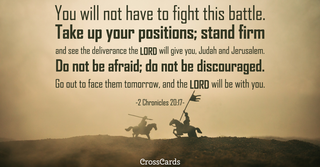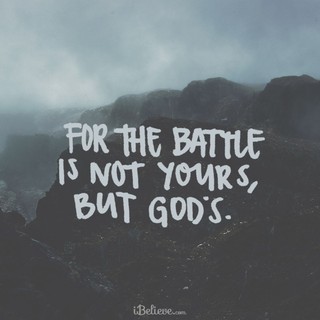
- Recent Translations
- All Translations
2 Chronicles 20
Share
Settings
Jehoshaphat Defeats Moab and Ammon
1 After this, the Moabites and Ammonites with some of the Meunites[a] came to wage war against Jehoshaphat.The End of Jehoshaphat’s Reign
31 So Jehoshaphat reigned over Judah. He was thirty-five years old when he became king of Judah, and he reigned in Jerusalem twenty-five years. His mother’s name was Azubah daughter of Shilhi.2 Chronicles 20 Commentary
Chapter 20
The danger and distress of Judah. (1-13) Jahaziel's prophecy of victory. (14-19) The thanksgiving of Judah. (20-30) Jehoshaphat's alliance with Ahaziah. (31-37)
Verses 1-13 In all dangers, public or personal, our first business should be to seek help from God. Hence the advantage of days for national fasting and prayer. From the first to the last of our seeking the Lord, we must approach him with humiliation for our sins, trusting only in his mercy and power. Jehoshaphat acknowledges the sovereign dominion of the Divine Providence. Lord, exert it on our behalf. Whom should we seek to, whom should we trust to for relief, but the God we have chosen and served. Those that use what they have for God, may comfortably hope he will secure it to them. Every true believer is a son of Abraham, a friend of God; with such the everlasting covenant is established, to such every promise belongs. We are assured of God's love, by his dwelling in human nature in the person of the Saviour. Jehoshaphat mentions the temple, as a token of God's favourable presence. He pleads the injustice of his enemies. We may well appeal to God against those that render us evil for good. Though he had a great army, he said, We have no might without thee; we rely upon thee.
Verses 14-19 The Spirit of prophecy came upon a Levite in the midst of the congregation. The Spirit, like the wind, blows where and on whom He listeth. He encouraged them to trust in God. Let the Christian soldier go out against his spiritual enemies, and the God of peace will make him more than a conqueror. Our trials will prove our gain. The advantage will be all our own, but the whole glory must be given to God.
Verses 20-30 Jehoshaphat exhorted his troops to firm faith in God. Faith inspires a man with true courage; nor will any thing help more to the establishing of the heart in shaking times, than a firm belief of the power, and mercy, and promise of God. In all our trust in the Lord, and our praises of him, let us especially look at his everlasting mercy to sinners through Jesus Christ. Never was an army so destroyed as that of the enemy. Thus God often makes wicked people destroy one another. And never was a victory celebrated with more solemn thanksgivings.
Verses 31-37 Jehoshaphat kept close to the worship of God, and did what he could to keep his people close to it. But after God had done such great things for him, given him not only victory, but wealth; after this, to go and join himself with a wicked king, was very ungrateful. What could he expect but that God would be angry with him? Yet it seems, he took the warning; for when Ahaziah afterward pressed him to join him, he would not, 1Ki. 22:49 . Thus the alliance was broken, and the Divine rebuke had its effect, at least for a season. Let us be thankful for any losses which may have prevented the loss of our immortal souls. Let us praise the Lord, who sought after us, and left us not to perish in our sins.
2 Chronicles 20 Commentaries
Cross References 41
-
1.
Psalms 83:6 -
2.
S
1 Chronicles 4:41 -
3.
2 Chronicles 24:24 -
4.
S
Genesis 14:7 -
5.
S
1 Samuel 23:29 ;Song of Songs 1:14 -
6.
1 Samuel 7:6 ;2 Chronicles 19:3 ;Ezra 8:21 ;Ezra 8:23 ;Nehemiah 1:4 ;Esther 4:16 ;Isaiah 58:6 ;Jeremiah 36:9 ;Daniel 9:3 ;Joel 1:14 ;Joel 2:15 ;John 3:5,7 -
7.
Jeremiah 36:6 -
8.
Matthew 6:9 -
9.
Deuteronomy 4:39 -
10.
1 Chronicles 29:11-12 -
11.
2 Chronicles 25:8 ;Job 25:2 ;Job 41:10 ;Job 42:2 ;Isaiah 14:27 ;Jeremiah 32:27 ;Jeremiah 49:19 -
12.
S
Genesis 12:7 -
13.
Isaiah 41:8 ;James 2:23 -
14.
2 Chronicles 6:20 -
15.
S
2 Chronicles 6:28 -
16.
Numbers 20:14-21 ;Dt 2:4-6,9,18-19 -
17.
Psalms 83:1-12 -
18.
Judges 11:27 -
19.
Psalms 25:15 ;Psalms 121:1-2 ;Isaiah 30:15 ;Isaiah 45:22 ;Micah 7:7 -
20.
S
1 Chronicles 12:18 ;2 Chronicles 15:1 -
21.
S
1 Chronicles 9:15 -
22.
2 Chronicles 32:7 -
23.
Exodus 14:13-14 ; S1 Samuel 17:47 ;Psalms 91:8 -
24.
S
Exodus 14:13 ;2 Chronicles 15:2 -
25.
S
Genesis 24:26 ;2 Chronicles 29:29 ;Exodus 4:31 -
26.
Isaiah 7:9 -
27.
S
Genesis 39:3 ;Proverbs 16:3 -
28.
S
1 Chronicles 16:29 ;Psalms 29:2 -
29.
S
2 Chronicles 5:13 ;Psalms 136:1 -
30.
Judges 7:22 ; S2 Chronicles 13:13 -
31.
S
Genesis 19:38 -
32.
2 Chronicles 21:8 -
33.
S
Judges 7:22 ;1 Samuel 14:20 ;Ezekiel 38:21 -
34.
S
Genesis 35:5 ; SDeuteronomy 2:25 ;2 Chronicles 14:14 ;2 Chronicles 17:10 -
35.
S
Exodus 14:14 -
36.
S
1 Chronicles 22:9 ;2 Chronicles 14:6-7 ;2 Chronicles 15:15 -
37.
S
2 Chronicles 17:6 ;2 Chronicles 19:3 -
38.
S
1 Kings 16:1 -
39.
S
2 Chronicles 16:3 -
40.
S
2 Chronicles 19:1-3 -
41.
S
1 Kings 9:26 ;2 Chronicles 9:21
Footnotes 7
- [a] Some Septuagint manuscripts; Hebrew "Ammonites"
- [b] One Hebrew manuscript; most Hebrew manuscripts, Septuagint and Vulgate "Aram"
- [c] Or "him with the splendor of"
- [d] Some Hebrew manuscripts and Vulgate; most Hebrew manuscripts "corpses"
- [e] "Berakah" means "praise."
- [f] Hebrew "of ships that could go to Tarshish"
- [g] Hebrew "sail for Tarshish"
Chapter Summary
INTRODUCTION TO 2 CHRONICLES 20
Jehoshaphat having notice of a numerous army coming against him, 2Ch 20:1,2, betakes himself to fasting and prayer with his people, 2Ch 20:3-13, when they were immediately assured of victory by a prophet, which filled them with joy and thankfulness, 2Ch 20:14-21, and accordingly their enemies destroyed one another, and Jehoshaphat and his people returned to Jerusalem rejoicing and praising God, 2Ch 20:22-30, and the chapter is closed with an account of the latter part of Jehoshaphat's reign, 2Ch 20:31-37.
